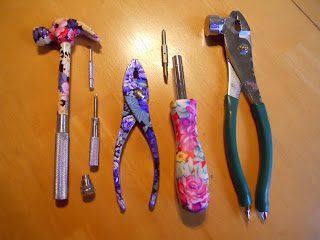How many “tools” have you used this morning?
 |
| “Some multi-purpose tools are colorful, others are utilitarian!” |
You might think this is an unusual question, but think about it for a minute. Since getting out of bed how many “tools” have you utilized? For example, let’s say you got up to take your shower and you discovered as you turned on the lights that one was burned out. You decide that you need to change the light bulb before you can continue with your morning ritual. So you get a step stool, because you can’t reach the light fixture without the step stool. You need your “hands” (the ultimate tool) to unscrew the set screws, you search for a tiny Phillips head screwdriver to remove the final screw, then you use your “eyes” to examine the replacement bulb to determine how to remove the blown bulb…and finally as you proceed, usually after dropping some little piece, you are successful in replacing the bulb and returning the light fixture to its original functioning condition. In this simple process of changing a light bulb you have used your brain, your eyes, your hands, a step stool, and screwdriver…and, oh, yes, you used the faucet to wash the glass lampshade.
But enough about changing a light bulb, let’s talk about Tools for Recovery.
Helpful Tools for Recovery
When someone decides that they want to recover from any illness, then they look for help, resources, support, and easy to remember steps. They look for “tools” to stock their toolkit; so that as they face a hard day or a road block they will be able to figure out which “tool” to use to get through one day at a time. Here at Cottonwood we frequently discuss tools for recovery, because we understand that recovery is a process. We provide tools to our clients, we teach our clients how to use these tools, we help them organize their toolbox, and we offer ongoing information via our social media networks so that our clients and alumni can keep adding to their Tools for Recovery.
Christopher Kennedy Lawford publishes “Recover to Live: Kick Any Habit, Manage Any Addiction”
Most people in recovery or those searching for recovery from addiction will tell you that they have numerous books about recovery. These might include their personal copy of Alcoholics Anonymous’ Big Book, The Twelve Traditions of Alcoholics Anonymous, or One Day At A Time In Al-Anon. Last November we published a post that included information about current books written by people who have found recovery. And so, today we wanted to tell you about Christopher Kennedy Lawford’s latest book “Recover to Live: Kick Any Habit, Manage Any Addiction.”
If you are not familiar with Christopher Kennedy Lawford, Amazon sums up his life in this one short sentence: “For most of his early life, Christopher Kennedy Lawford battled life-threatening alcohol and drug addictions. Now in recovery for more
than 25 years, he works to effect change and raise global awareness of
addiction in nonprofit, private, and government circles, serving as the
goodwill ambassador for drug dependence treatment and care for the
United Nations.”
First cousins, Christopher Kennedy Lawford and Patrick Kennedy, discuss addiction
On Monday, January 7, 2012, Christopher Kennedy Lawford and his first cousin, former Congressman Patrick Kennedy, were interviewed by Savannah Guthrie on NBC’s TODAY show discussing addiction and recovery.
If you are having trouble viewing the video, you can see it here.
Today why not straighten up your tool box…
A tool box is like any other container in which we store things, like a purse, backpack, a briefcase or even a kitchen junk drawer. We keep adding items for “safekeeping”, but then when we go to look for some critical item or tool we can never seem to find it. So today, why not take a step and straighten up your tool boxes? Sort through your tools for recovery, find the ones that work best for you, make sure they are in good working order and remember to share these with someone who is seeking recovery.
By the way, what’s your favorite tool for recovery?







